Ukraine’s long-persecuted Roma minority joins war effort
Members of the Roma community proudly serve in Ukraine’s army fighting against Russia, but some fear the discrimination that awaits them when the war ends.
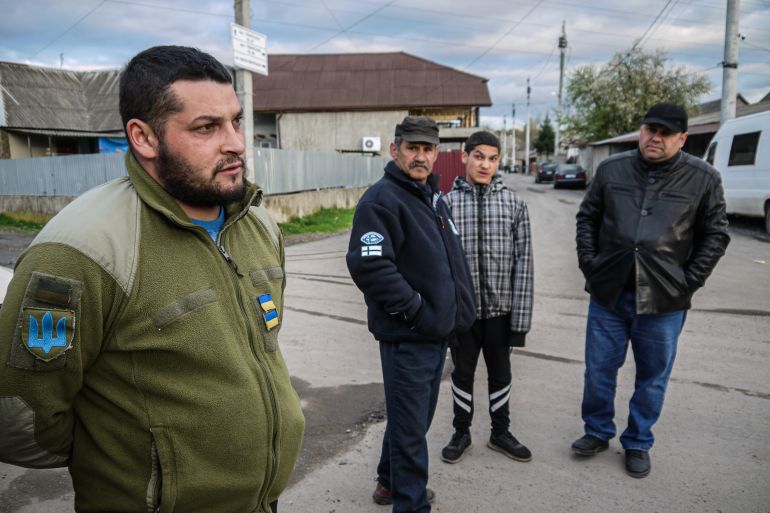
Uzhhorod, Ukraine – “It was his dream to defend Ukraine,” 23-year-old Angelina Debyosh says of her husband, who is fighting Russian forces in Mariupol, on the other side of Ukraine.
In her small and bare house with a sloping floor in Uzhhorod, in the war-torn country’s southwest, a gaggle of kids crowd onto a loose mattress that serves as a main piece of furniture.
Keep reading
list of 4 itemsPolice killing puts spotlight on anti-Roma racism in Greece
Ukraine’s Roma refugees recount discrimination en route to safety
Photos: Romanians jump into action for Ukrainian refugees
Debyosh’s husband, 31-year-old Igor Kotlar, is a former taxi driver who enlisted in the Ukrainian army in 2018.
They share five young daughters and are both of a Roma background.
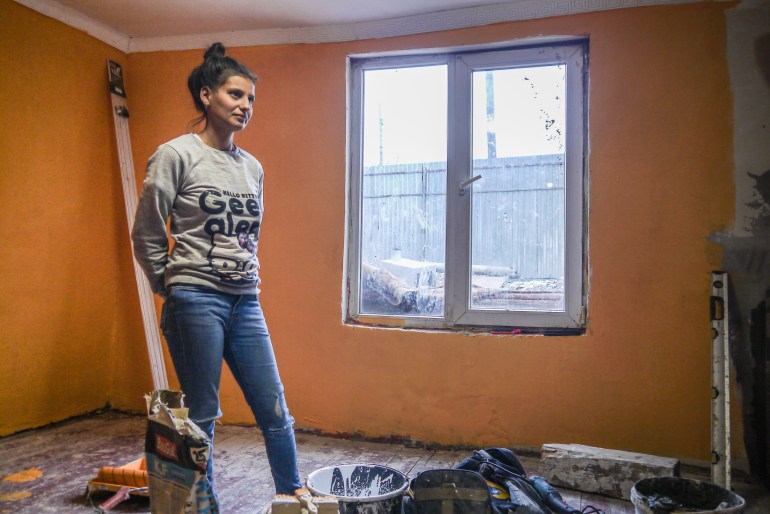
The road through their settlement, Radvanka, which runs next to a cement factory in the border city near Hungary and Slovakia, is pockmarked.
Houses here are visibly hand-built from cinder blocks, some with gaps in the walls, and lack gas and running water.
Municipal services, like trash removal, are absent.
Despite being persecuted and marginalised throughout Ukraine’s history, the Roma minority – an estimated 400,000 people – have contributed enthusiastically to the war effort.
In dilapidated Roma neighbourhoods like Radvanka, Ukrainian flags are often seen fastened to walls or on flag posts.
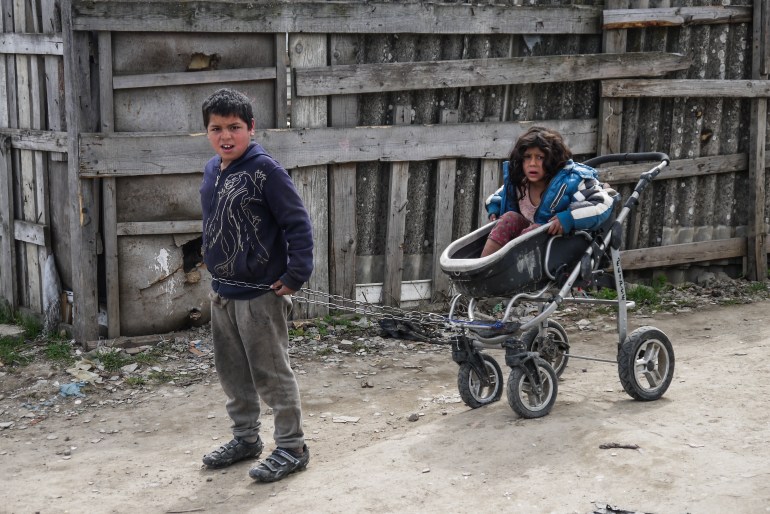
Since the start of the Russian invasion on February 24, Roma churches have collected food and medicine, and in western Ukraine, Roma volunteers have provided shelter to Roma and non-Roma evacuees.
Several families Al Jazeera interviewed said with pride that they boasted more than one service member.
According to Angelina, two of Igor’s relatives – a cousin and an uncle – are also fighting in the army.
“[The war] has brought us together,” ventured Myroslav Horvat, a Uzhhorod city councillor, and one of two ethnic Roma on the 38-member elected body.
“This genocide that is happening in Ukraine is a shared misfortune. When the bombs fall, they don’t just fall on Roma or non-Roma; they fall on everyone.”
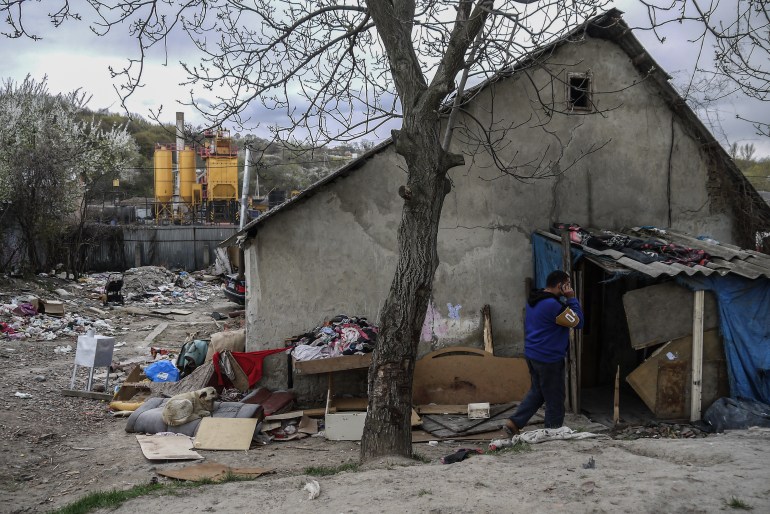
Downtown Uzhhorod is a more comfortable area. It has a substantial middle class, and mainstream city dwellers live in apartment blocks connected to utilities.
By contrast, the Roma here subsist in settlements they built for themselves decades ago, that have been never fully recognised or provided for by the municipality.
This pattern of marginalisation is repeated in many Ukrainian cities. Poverty and social exclusion are common, as are social prejudices that associate the Roma with crime.
But Roma soldiers are among those who have been deployed to the war’s toughest locales.
Horvat estimates at least 60 Roma from the Transcarpathian region, which includes Uzhhorod, are now fighting with Ukrainian forces.
‘Ukraine will be different’
On a brisk April evening, in another part of Radvanka, a second Roma soldier shows his wound.
Viktor Ilchak, a 30-year-old father of four, is a tank mechanic.
In March, the armoured vehicle in which he was riding was hit when he was surrounded in a battle by Russian forces in Volnovakha, a city north of Mariupol.
Pieces of shrapnel lodged in his left arm and he was evacuated to a hospital.
He is now at home in Uzhhorod, awaiting redeployment.
Like Igor, Viktor served before the war escalated: he has volunteered for deployments since 2015, confronting Russian-backed separatists in the country’s east.
“On the front line, there is no nation,” he said.
A short, peppy man, he poses confidently in front of a Ukrainian flag.
“Whether you’re Roma, Azeri or Ukrainian, we’re all friends,” he said. “Everything is collective. We consider each other brothers.”
He believes that the Roma soldiers’ service will improve relations between the community and other Ukrainians after the war.
“[They will see that] that Gypsies serve too, that [we’re] good lads.”
Myroslav, the city councillor, had similar hopes.
“People will change,” he said. “Ukraine will be different.”
Such optimism is refreshing, but Ukrainian media outlets have not been too proactive in reporting the Roma community’s efforts, and many outside are unaware of their contribution.
And while the war is creating a sense of unity, a shared sense of patriotism is unlikely to ease the level of discrimination faced by the minority.
When the war ends, Roma service members who survive the conflict will return to dirt-poor communities where barriers to social integration remain and where the pace of change is glacial.
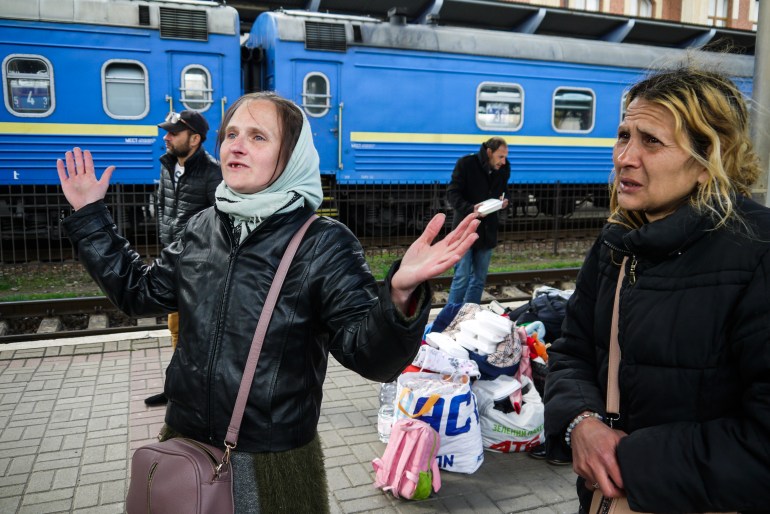
“The conditions Roma live in are very hard,” admitted Myroslav. “Many houses have no water and no heat. There’s nowhere to put [garbage]. I’ve asked them a thousand times for them to put another [rubbish] container here, but … it’s difficult.”
Myroslav faults the Ukrainian educational system for segregating Roma children into Roma-only schools, and laments the lack of job options in the community.
“A great number of people from here work abroad,” he said.
Many Roma workers end up in construction jobs abroad, but the pattern of migration has been interrupted by Ukraine’s wartime legislation, which bars men of fighting age from leaving the country.
Sasha (a pseudonym), a Roma activist from Uzhhorod, said a strategy for integrating Roma into Ukrainian society was created, and recently renewed, as part of the country’s attempt to become a European Union member, but that the programmes associated with this scheme exist “only on paper”.
He believes the only path forward is for the EU to force Ukraine to respect Roma rights.
“If we join the EU [things will change],” he said. “If we don’t, they won’t.”
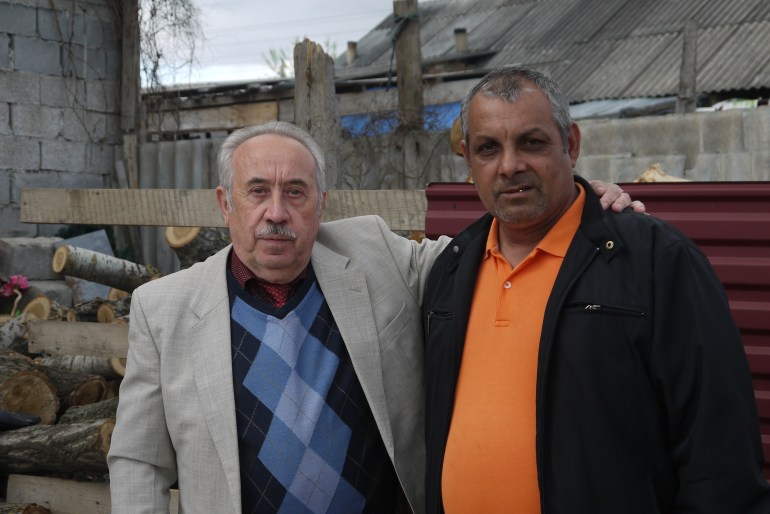
Ivan Balog, a Roma pastor and Radvanka resident, holds up the medals he received in eastern Ukraine in 2016, as a military padre ministering to soldiers on the front line of what was then a low-intensity fight against Russia-backed separatists.
On an everyday level, the marginalisation of Roma is expressed in their exclusion from services, but on occasion, hatred takes on a vicious form.
There is a history of attacks by Ukrainian far-right or nationalist vigilante groups against Roma.
In one such case four years ago, a 23-year-old Roma man, David Popp, from a village near Uzhhorod, was stabbed to death while sleeping in a migrant camp outside Lviv.
And as recently as February 28, four days after the Russian invasion began, the pattern appeared to reassert itself.
On that night, a group of non-Roma youth appeared in the Roma settlement of Telman, a few kilometres from downtown Uzhhorod, with firearms, according to Balog and a second Roma source in Uzhhorod who wished to remain anonymous.
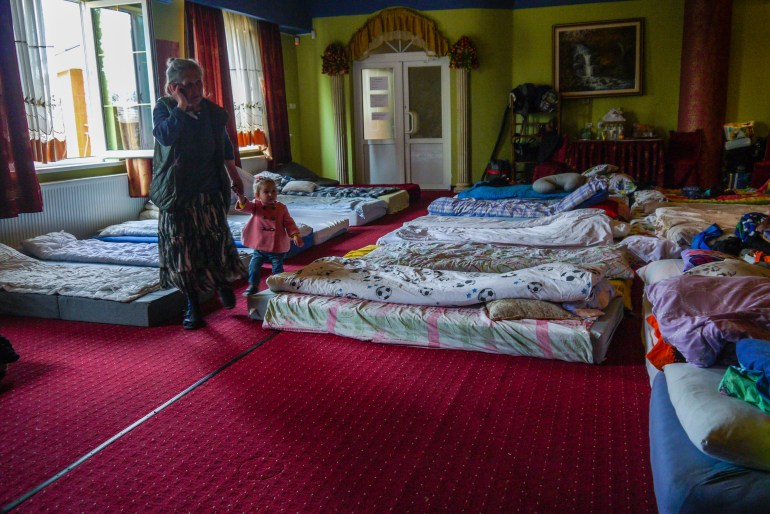
The non-Roma accused a Roma man of stealing some metal, they said.
The non-Roma then opened fire, and wounded five Roma, including a 26-year-old who died a week later from a stomach wound, according to both sources.
The anonymous source said a video, since taken offline, was posted by an individual in Uzhhorod a few hours after the attack warning Roma not to steal, or they would be “dealt with”.
Police attended the crime scene and arrested suspects, but what happened next is unknown, according to both sources.
“They know who it was, but they said they would only deal with it after the war,” Balog said of the local police force, adding that his sons gave blood to the man who ultimately died.
“A Gyspy died, so what?” Balog said, referring to the wider society’s general view of Roma lives.
The anonymous source suggested that the attackers deliberately took advantage of the war situation to commit their crime, believing that there was less chance it would be investigated.
Al Jazeera was unable to independently verify the details of the incident, but alleged vigilantism against civilians accused of looting has been widely reported since the war began, with cases of people being tied up, stripped and beaten in brutal acts of public humiliation.
Ukraine’s official record of responding to hate anti-Roma crimes is varied.
In the capital Kyiv, several cases of non-lethal attacks against Roma migrant camps, such as arson, have not been prosecuted – including those caught on video.
Al Jazeera contacted the Uzhhorod Police Force with questions about the February 28 attack, but had not received a response at the time of publishing.
But in a short interview with Al Jazeera about the general condition of the local Roma community, Bohdan Andriiv, the mayor of Uzhhorod, argued that their homes cannot be serviced with running gas or water, for example, because they do not possess documents proving home ownership.
The mayor claimed such documents cannot be produced because the houses were built illegally.
An assistant in the city administration offered some hope, saying identification documents, which many Roma also lack, were being worked on, but did not provide a timetable of when this process would be completed. He also said the country cannot spend money on social services like these at a time of war.
“I think attitudes towards the Roma will change after the war. For a certain time, people will say positive things about them,” said Sasha, the activist. “But with time, those attitudes will go back to where they were.”
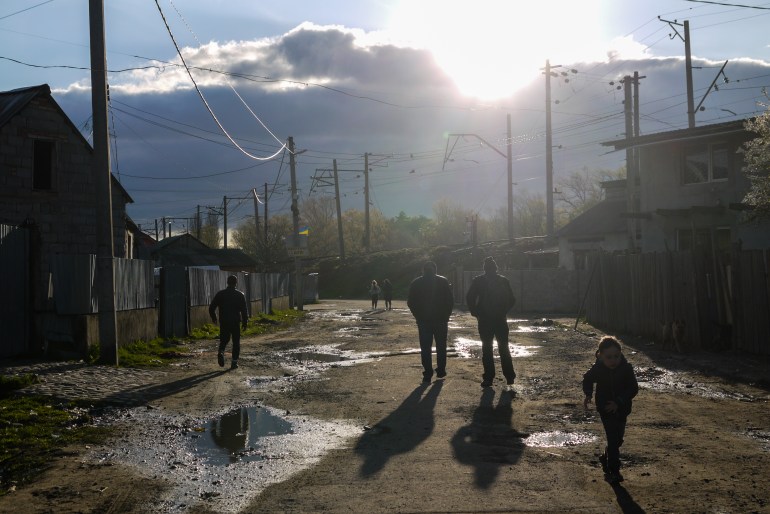
Kamila Kielar contributed to the reporting for this article.